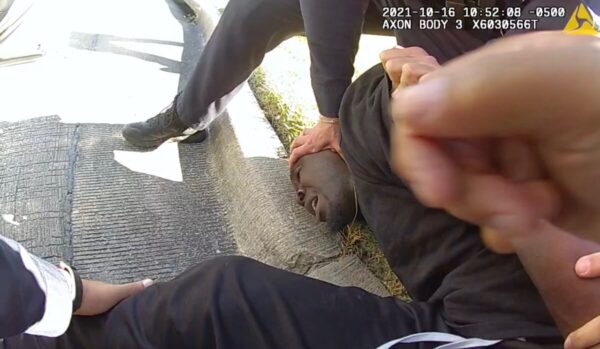‘All I Could Think About Was My Kids’: Barbaric Dallas Cops Dislocates Black Security Guard’s Arm During Violent Mistaken-Identity Arrest
A Texas man says in a federal lawsuit that multiple Dallas officers used excessive force when they pulled him over during a traffic stop two years ago.
He alleges they mistook him for a violent crime suspect with a similar name, thus detaining him for no just cause.
Silvester Hayes, a 27-year-old Black former security guard, filed his complaint against 10 officers and the Dallas Police Department, outlining his Oct. 16, 2021, arrest.
Hayes believes the ordeal transpired because he was being racially profiled by the police.
Trending Today:
On the morning of the arrest, he was on the way to pick up breakfast for his family before being pulled over by the officers. Hayes handed over his driver’s license to the officers. Officer Holly Harris told Officer Walter Paul Guab that based on the name, he was a wanted man, the complaint says. She did not check to see if the names matched by looking at the spelling but assumed they had the right person based on how the name sounded.
Hayes’ attorneys say Guab also never ran the license or verified the identification, but instead, he began to arrest Hayes. That person they thought they were stopping, Sylvester Hayes, had an outstanding family violence warrant and was listed as someone to be pulled in upon contact.
The male officer immediately reached into the driver’s side door and tried to open it.
The officers did not tell Hayes why he was being detained nor allowed him to explain that he was not the person of interest, Hayes claims.
Robinius, Espinosa & Wietzel, the law firm representing Hayes in this case, provided the press bodycam footage from some of the officers named in the lawsuit. They also allege the Dallas Police Department did not adequately train the officers and “failed to discipline” them after their client was released.
In the claim, he alleged the police officers not only forcibly removed him from his car but used excessive force, including kneeling on his skull, neck, and back, kicking, punching, and using a Taser on him, before arresting him on resisting arrest and unlawful possession of a firearm charge.
When speaking about the incident, the young man said in an interview with The Dallas News, “It was traumatizing.”
Hayes says officers dislocated his arm before realizing he was not the person he was looking for.
According to the lawsuit, the injuries Hayes sustained, particularly his dislocated arm, have caused him “ongoing pain and mobility issues,” drastically impacting his life.
Adding to the chaos of the arrest was the fact that Hayes had a firearm in the car. He told the officers that he had one, and they used that information to escalate the drama.
“In a proverbial case of gasoline being poured on a fire, having multiple Dallas Police Officers yelling ‘Gun’ only escalated the Officers’ use of excessive force on Plaintiff Hayes,” the complaint says.
He was arrested and jailed for “multiple days” before the charges were dropped. The father of four said he now suffers from “emotional distress and post-traumatic stress syndrome” following the arrest and subsequently was fired from his job.
“All I could think about was my kids,” Hayes recalled. “To think that I was just going to go get something to eat for them and for that day to turn out how it did, it was definitely terrifying.”
Hayes believes the ordeal transpired because he was being racially profiled by the police.
“Defendant Dallas’ Police Department has a pattern, practice, history, and custom of using excessive force against minorities, racial profiling, detaining on false pretenses, and approaching them with guns drawn, when there is no imminent threat of bodily harm or other justifiable reason to do so,” the lawsuit stated, according to The Independent.
Now, Hayes is asking the courts to give him a trial by jury. Should the court find his civil rights were violated, he is asking the court to award him an unspecified amount in compensation, including damages for his injuries.

